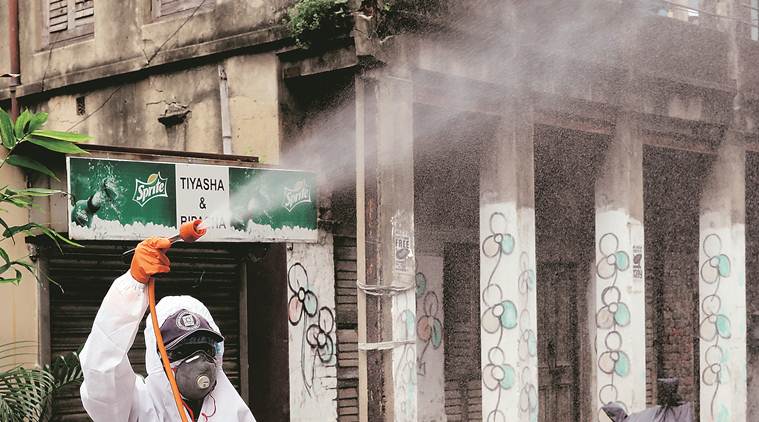
[ad_1]
 A KMC worker sprays disinfectant in a containment zone at Ultadanga in Kolkata. (Express photo by Partha Paul)
A KMC worker sprays disinfectant in a containment zone at Ultadanga in Kolkata. (Express photo by Partha Paul)
EVEN AS the number of daily Covid tests goes up from a few thousand in March to over 2 lakh in July, a glut of RT-PCR testing kits has both domestic manufacturers and multinational importers grumbling about government policies that one of them described as “baffling”.
Read | Polyclinics, dispensaries across Delhi to now offer antigen testing
While India has reached the 10-million-test landmark, domestic manufacturers supply only 25-30% of RT-PCR kits used. Given that ICMR has validated over two dozen Indian manufacturers, that is a small improvement from the country’s 100% dependence on imported test kits in March.
A number of domestic players told The Indian Express that they could not compete with the MNCs with deep pockets unless the government reconsidered its decision on zero import duty, stipulated a domestic quota and price benefit in tender, and allowed export of surplus stock.
Several multinationals, on the other hand, claimed that most domestic manufacturers “import raw material to assemble products in the name of Make in India” and “certain quality issues are evident from the low acceptance of Indian test kits even in the private segment”.
Read | Greenshoots visible, India to play big role in global revival: PM
The domestic manufacturers blamed this “bias” on “fascination for foreign products” and claimed that Indian kits are made of “80-100% indigenous components”.
What has further riled the domestic manufacturers is a restriction on exporting RT-PCR kits. “Our policies are baffling. Korea, for example, banned import of test kits to back their domestic products. We, on the other hand, have banned export while Korean companies are the big suppliers in India,” said Shesheer Kumar, director of Hyderabad’s Huwel Lifesciences.
Facing the glut, a number of domestic companies and the Association of Indian Medical Device Industry (AIMED) have reached out to the government seeking permission for export. A meeting with the regulators, it is learnt, took place last week. There has not been any assurance yet.
Read | For Gujarat tribal children with no TV or Internet, school comes home on their teacher’s smartphone
“Globally, MNCs are sitting on huge stocks even as antigen kits are replacing PCR kits. A few Indian companies had queries from Africa, Latin America and south-east Asia but may have missed the bus waiting for the government (to allow export),” said the director of a pharma company in Bhopal.
“The item is on the restricted list and can be exported only under licence. Yes, the process takes time and no licence has been issued for RT-PCR kits yet. The DGFT will remove the restriction if the assessment of the ICMR or the ministry concerned says there is a surplus stock for export,” said a senior Commerce Ministry official.
Read | 110 migrants died on Railway premises when Shramik Special trains were run
“It is not in ICMR’s purview to decide on export restrictions. But Indian kits are as good as foreign kits in quality and efficacy. NIV-Pune is also manufacturing kits. The competition is the same for every manufacturer, Indian or foreign,” said Dr Rajni Kant, Head, Research Management, Policy, Planning and Coordination, ICMR.
Read | COVID tests: Private labs under scanner, PCMC asks them to strictly adhere to norms
Meanwhile, the battle for the domestic pie has intensified. On June 26, flagging a tender that sought Korean certification rather than ICMR approval for RT-PCR kits to apparently favour certain MNCs, the AIMED demanded 15% price benefit for Indian origin goods with over 50% domestic content. HLL Lifecare, a national procurement support agency, withdrew the RT-PCR tender.
Another flashpoint was a tender for 2.9 million RT-PCR kits awarded by the ICMR in the second week of June. While two multinationals bagged sizeable chunks, the bulk of the order went to a domestic manufacturer in Madhya Pradesh.
Read | Maharashtra: Soon, state to fix price cap for antibody test
An MNC in the fray, say sources, complained that the domestic manufacturer did not have a validated product to meet the tender specification. But for its versatility, countered the domestic rival, the company would have been disqualified due to certain late changes made in the tender.
At the moment, US and South Korean companies dominate the market with Pune’s MyLab emerging as the biggest domestic player (see box). MyLab has supplied over 1.6 million kits, mostly to government agencies, indicating a market share of 15-20%. “We have reached a manufacturing capacity of 3lakh/day — sufficient for meeting the entire domestic demand,” said a company spokesperson.
The flip side, of course, is that the stiff competition has driven down prices.
From Rs 1,100-1,400 in March, the price of RT-PCR test units fell to below Rs 500 in June. Globally, too, the price has come down from $25 to under $10. “We can save the government a lot of money. The price is likely to side further in the coming weeks, eventually stabilising at around Rs 300-325,” says a domestic manufacturer.
📣 The Indian Express is now on Telegram. Click here to join our channel (@indianexpress) and stay updated with the latest headlines
For all the latest India News, download Indian Express App.
© The Indian Express (P) Ltd
[ad_2]
Source link